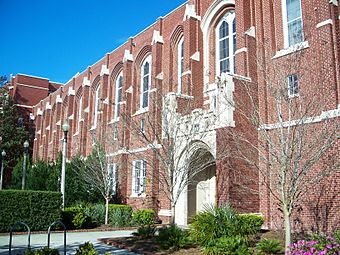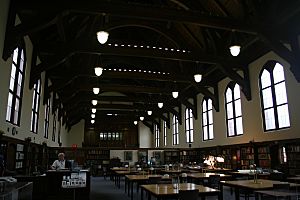Library East (Gainesville, Florida) facts for kids
Quick facts for kids |
|
|
Library East
|
|
 |
|
| Location | Gainesville, Florida |
|---|---|
| Architect | William A. Edwards Guy Fulton |
| NRHP reference No. | 79000656 |
| Added to NRHP | June 27, 1979 |
Library East, also known as Smathers Library, is a very old and important library in Gainesville, Florida. It's right in the middle of the University of Florida campus. When it first opened, it was the biggest building there! Today, it's part of the George A. Smathers Libraries and holds tons of books and other cool stuff.
Contents
History of Smathers Library
This amazing building was designed by an architect named William A. Edwards. It first opened its doors in October 1926. After World War II, another architect, Guy Fulton, added a big new part to the library.
On June 27, 1979, the library was added to the National Register of Historic Places. This means it's a special building that is important to the history of the United States. In 1991, the library got a new name, Smathers Library. This was to honor George Smathers, a former U.S. Senator, who gave a very generous gift to the library.
Explore the Map & Imagery Library
The Map & Imagery Library is on the ground floor of Smathers Library. It has a huge collection of different items. Imagine finding about 500,000 maps here! There are also 300,000 aerial photographs and satellite images. You can also find 8,000 atlases and reference books. Plus, they have a growing number of digital maps and data.
This library is one of the biggest academic map libraries in the United States. It specializes in maps and images about Florida, Latin America, the Middle East, and Africa. It's open to everyone on weekdays.
Special Collections Grand Reading Room
On the second floor of Smathers Library, you'll find the Special Collections Grand Reading Room. This is where you can look at many unique items from the George A. Smathers Libraries. These special materials cannot be checked out or taken home. So, if you want to see them, you must do it in this room. Library staff will be there to help you.
Some of the cool collections you can see here include:
- The University Archives (old records from the university)
- The Architecture Archives (drawings and plans of buildings)
- The P. K. Yonge Library of Florida History (books about Florida's past)
- The Baldwin Library of Historical Children's Literature (old children's books!)
- The Manuscript Collection (original handwritten documents)
- The Popular Culture Collections (items about movies, music, and more)
- The Rare Books Collections (very old and valuable books)
Judaica Suite: A Special Reading Area
In January 2014, the Judaica Suite opened. It's a group of reading rooms connected to the Special Collections Grand Reading Room. This area holds books from the University's Isser and Rae Price Library of Judaica. Many of these books are very rare.
Inside the Suite, books are grouped together in different areas. These groups show different times in the history of Jewish literature and culture. The Judaica Suite was designed by a famous architect and artist, Kenneth Treister. He also went to the University of Florida!
Latin American and Caribbean Collection
The third floor of Smathers Library is home to the Latin American and Caribbean Collection. This collection started in 1951. People wanted to learn more about Latin America and the Caribbean. Since then, it has become one of the University of Florida's best collections.
The collection is in a newly updated space. It has about 500,000 books and thousands of journal titles. There are also many digital resources. About 70% of these materials are in Spanish, French, and Portuguese. Most of the rest are in English. But you can also find materials in Haitian Creole, Dutch, and even some indigenous languages.
The collection covers all of the Caribbean and Latin America. However, it focuses a lot on the Caribbean and Brazil. You can find original documents from the Caribbean. These documents cover topics from farming to revolutions. This library also has its own reading rooms and help desks. It's open to the public usually six days a week.




